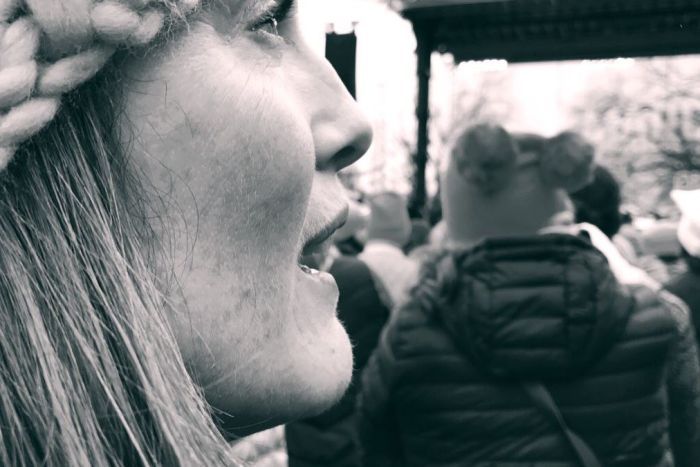Donald Trump: Women's March rallies bring millions together worldwide to protest against new US President
Updated
Millions of people from all over the world have marched in opposition to the agenda and rhetoric of President Donald Trump.
Key points:
- Demonstrations in 60 countries around the world spurred by concern for women's rights under Trump administration
- More than 500,000 attend Washington DC march
- Celebrities, politicians join in protests in major cities
There have been more than 600 rallies in 60 countries around the world, expressing concern that women's rights will be eroded under Mr Trump.
In the United States, people packed into the country's capital for the Women's March on Washington, as hundreds of other marches happened across America.
A city official in Washington said the turnout estimate was at 500,000 people, more than double the initial predictions, forcing organisers to abandon plans to march towards the White House.
Figures from transport officials in Washington suggested more people attended the march than came for Mr Trump's inauguration.
By 11:00am on Sunday (local time), the city's subway system had carried 275,000 people, whereas only 193,000 had taken trips by the same time on Inauguration Day.
Interim DC Police Chief Peter Newsham said: "The crowd stretches so far that there's no room left to march".
So many people turned up to the march in Chicago that organisers cancelled a planned march through the city's downtown, while marches in New York and Philadelphia also experienced larger-than-expected crowds.
Organisers said 750,000 people attended the march in Los Angeles — a huge increase on the 150,000 originally expected.
Former Democratic nominee for president Hillary Clinton praised those attending the marches on Twitter, reviving her campaign slogan "Stronger Together".
Women's marches also took place in Australia and New Zealand on Saturday (local time), with an estimated 2,000 to 3,000 people marching through the streets of Sydney alone.
The Women's March on Washington, featuring speakers, celebrity appearances and a protest walk along the National Mall, was planned as a counter-argument to Mr Trump's populist presidential campaign, in which he angered many on the left with comments seen as demeaning to women, Mexicans and Muslims.
The mission statement of the Women's March says event participants are "hurting and scared" as Mr Trump takes office, and they want a greater voice for women in political life.
The Washington march comes one day after Mr Trump's inauguration, which saw the US capital rocked by violent protests against the new President.
Black-clad anti-establishment activists smashed windows, set vehicles on fire and fought with riot-gear-clad police who responded with stun grenades.
The protests illustrated the depth of the anger in a deeply divided country that is still recovering from the scarring 2016 campaign season.
 Video: Hundreds of thousands of people marched in cities across the US. (Photo AP/Jose Luis Magana)
(ABC News)
Video: Hundreds of thousands of people marched in cities across the US. (Photo AP/Jose Luis Magana)
(ABC News)
Women march in protest across all seven continents
The women marching in Washington DC were joined by thousands more around the world.
Similar rallies were held in London, Berlin, Rome and hundreds of other cities in Europe, South America, Africa and the Middle East, with organisers estimating a turnout of more than 3 million people.
Even the freezing temperatures of Antarctica could not stop participants from gathering for the Penguins for Peace march, or the Women's March Antarctica, aboard an expedition ship.
In Park City, Utah, it was Charlize Theron leading demonstrators in a chant of "Love, not hate, makes America great".
In New York, actresses Helen Mirren and Cynthia Nixon and Whoopi Goldberg joined a crowd of protesters marching to Mr Trump's local home.
In Paris, thousands rallied in the Eiffel Tower neighbourhood in a joyful atmosphere, singing and carrying posters reading "We have our eyes on you Mr Trump" and "With our sisters in Washington".
Hundreds gathered in Prague's Wenceslas Square in freezing weather, mockingly waving portraits of Mr Trump and Russia's Vladimir Putin.
"We are worried about the way some politicians talk, especially during the American elections," said organiser Johanna Nejedlova.
In Sydney, thousands of Australians gathered in solidarity in Hyde Park.
One organiser said hatred, bigotry and racism were not only America's problems.
In Copenhagen, Denmark, protesters in the march's trademark pink woollen hats met outside the US Embassy.
March participant Sherin Khankan said "an alternative to the growing hatred must be created".
At a rally in Stockholm, Sweden, organiser Lotta Kuylenstjerna said "we do not have to accept his message", in a reference to Mr Trump.
Marchers hope to protest, as well as inspire other women
 Photo:
A woman holds a red rose during the Women's March in Washington DC. (Reuters/Shannon Stapleton)
Photo:
A woman holds a red rose during the Women's March in Washington DC. (Reuters/Shannon Stapleton)
The organisers of the Women's March on Washington said they had extensive security plans in place, and would have both visible and hard-to-spot security workers along the route.
The event, the brainchild of Hawaiian grandmother Teresa Shook, was intended as an outlet for women and men who consider themselves feminists to vent their frustration and anxiety over Mr Trump's victory.
It spotlights the fierce opposition Mr Trump faces as he takes office, a period that is typically more of a honeymoon than a hatefest.
A recent ABC News/Washington Post poll found Mr Trump had the lowest favourability rating of any incoming president since the 1970s.
Women reached by Reuters gave a host of reasons for marching, ranging from inspiring other women to run for office to protesting against Mr Trump's plans to repeal the 2010 Affordable Care Act, which among other things requires health insurers to cover birth control.
Overall, the women said they hoped to send a unity message to Mr Trump after a campaign in which he said Mexican immigrants were "rapists", discussed banning Muslims from entering the United States, and was revealed to have once bragged about grabbing women by the genitals and kissing them without permission.
One march participant, Carli Baklashev, a stay-at-home mother of five boys from Missouri, said: "I want to resist the ideology of everything that he stands for and teach my children that love, empathy and inclusion and diversity are a staple of who we are."
Mr Trump's team did not respond to a request for comment about the march.
Reuters/AP
Topics: us-elections, world-politics, feminism, rights, women, united-states
First posted






















